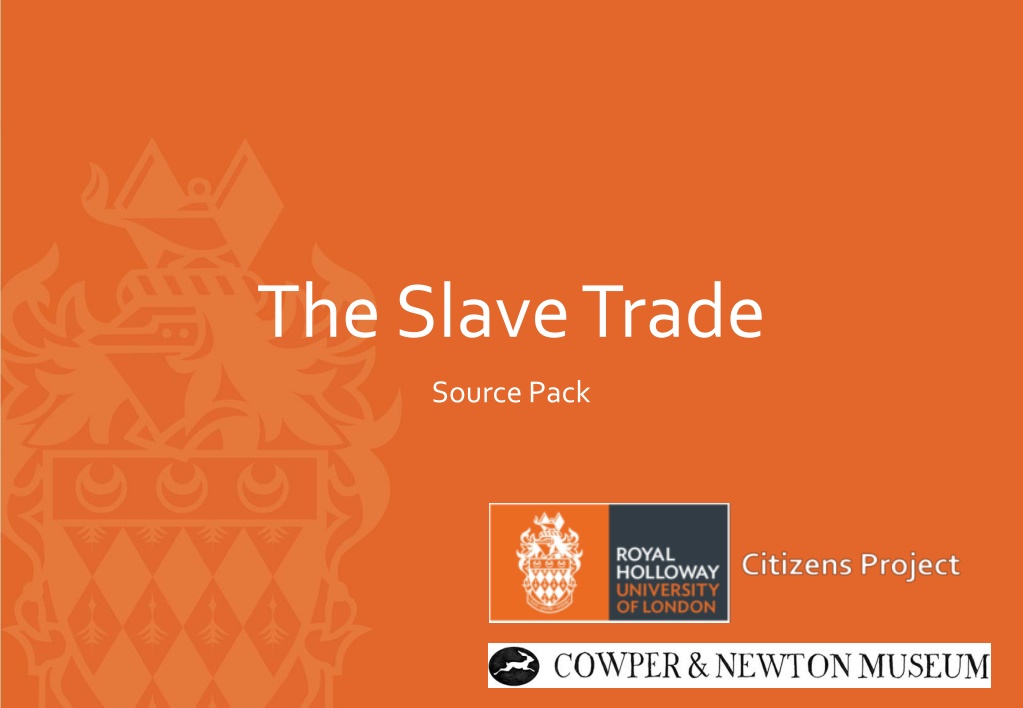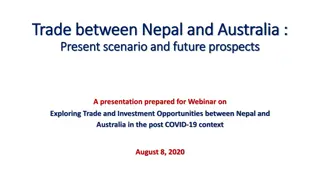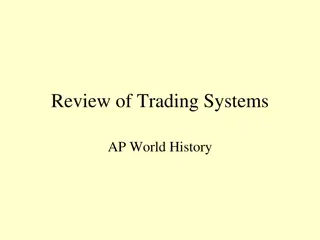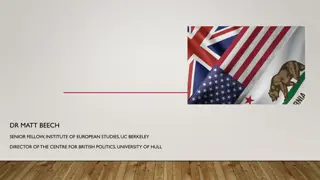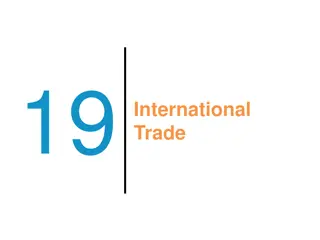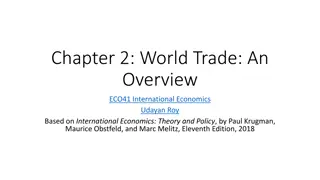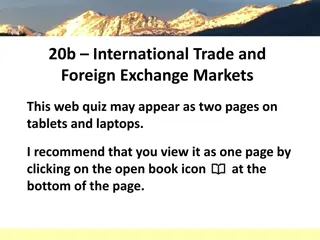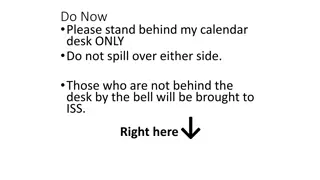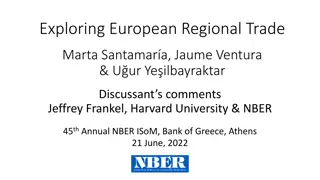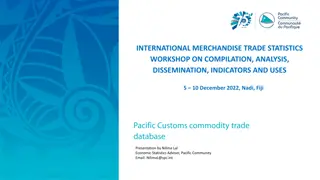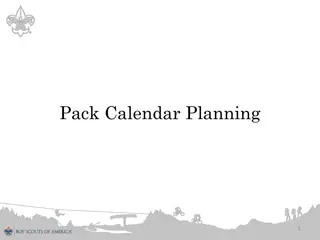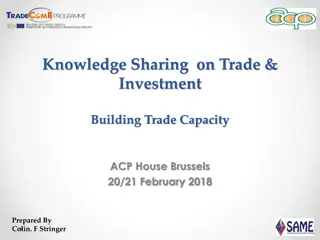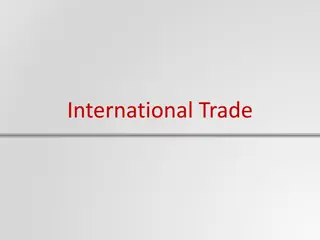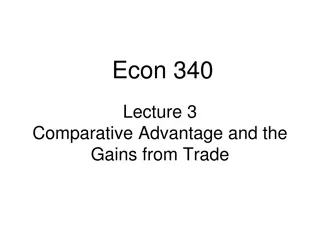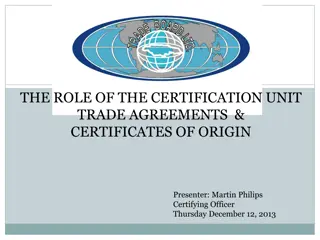The Slave Trade Source Pack and Key Information
Explore the history of the slave trade, key terminology, primary sources, and influential figures like John Newton, William Wilberforce, Mary Prince, and Olaudah Equiano. Learn about the Triangular Trade, Middle Passage, and the impact of the Industrial Revolution. Discover how abolition was achieved in 1807 with the help of various groups. Delve into the lives of those involved in buying, selling, and advocating for the end of slavery.
Download Presentation

Please find below an Image/Link to download the presentation.
The content on the website is provided AS IS for your information and personal use only. It may not be sold, licensed, or shared on other websites without obtaining consent from the author.If you encounter any issues during the download, it is possible that the publisher has removed the file from their server.
You are allowed to download the files provided on this website for personal or commercial use, subject to the condition that they are used lawfully. All files are the property of their respective owners.
The content on the website is provided AS IS for your information and personal use only. It may not be sold, licensed, or shared on other websites without obtaining consent from the author.
E N D
Presentation Transcript
The Slave Trade Source Pack
Key to Slides Key Information and Terminology Resources and Activities Primary Sources Historiography Slavery & Racism Today
Key Words Triangular trade: described journeys between England, Africa, and the West Indies by ships buying & selling slaves and goods. Guinea: the Atlantic coast of Africa from which slaves were frequently purchased by European traders Guineamen: ships built with the primary purpose of transporting slaves from Africa Slave factories: trading posts along the coast of West Africa which specialised in selling slaves Middle passage: the journey between Africa and the West Indies during which many slaves perished Industrial Revolution: a period of growth in Britain due to new industrial inventions - steam engine, machines to help factories mass produce, and the railway.
Key Information Slaves were purchased from Guinea (the Atlantic coast of Africa) by Europeans, and sold by those operating slave factories on the coast. Those involved in the land-based slave trade in Africa included indigenous African sellers, Europeans who had moved to Africa to participate in the trade, and those noted as mallata due to having one black African parent and one white European parent. Slaves were considered to be equivalent to merchandise, goods owned, bought, and sold by (often white) traders and plantation owners. Profits from the slave trade were obviously reaped by those directly involved with the slave trade. Also to benefit, were the general public who saw economic growth of Britain with a substantial contribution by the work of slaves. Abolition of the Slave Trade was achieved in 1807: with the aid of many groups, including: black communities, women, religious groups (especially Quakers), and the (predominantly Anglican) Clapham Sect.
Key People within the FIlms John Newton former slave ship captain who repented of his participation in the slave trade and became an key advocate of its abolition. William Cowper Poet, hymnodist, and friend of John Newton who wrote poetry in support of the abolitionist movement. Olaudah Equiano A renowned writer who self-emancipated and moved to Britain, and became a prominent Abolitionist. His renowned autobiography was a popular-read with an intimate depiction of slavery s horrors.
Key People within the films Mary Prince First black woman to present a petition to Parliament. Was formerly enslaved in the West Indies, until her oppressors brought her to Britain. William Wilberforce Renowned figure for the Abolition of Slavery in Britain; utilised his position as an MP to push the anti-slavery agenda. Thomas Clarkson Key figure in the Abolitionist cause: helped to form the Abolition Committee. Travelled around Britain collecting evidence about the horrors of the slave trade.
Timeline 1725 Birth of John Newton 1731 Birth of William Cowper 1745 Birth of Olaudah Equiano 1750 John Newton s first journey as Slave Ship Captain 1759 Birth of William Wilberforce 1781 The Zong ship captain and crew throw nearly 150 slaves into the sea, for insurance money 1787 John Newton vocalised support for abolishing the slave trade; publishes Thoughts upon the African Slave Trade 1789 Olaudah Equiano publishes The Interesting Narrative of the Life of Olaudah Equiano, or Gustavus Vassa, the African 1790 The first bill to abolish the Slave Trade fails
Timeline 1791 Slave rebellion on St Domingue 1792 Abolition Bill passes the House of Common, rejected by the House of Lords 1797 Death of Olaudah Equiano 1800 Death of Wiliam Cowper 1804 Slave rebellion on St Domingue results in establishment of first black state outside of Africa Haiti 1807 Transatlantic slave trade is abolished in Britain. 1807 Death of John Newton 1833 Death of Mary Prince 1833 Abolition of Slavery Act passed in British parliament applicable to Britain and all its territories.
Resources & Activities
Resources (These films are currently under production and will be made freely available Royal Holloway, University of London History Hub YouTube channel. Other related videos are already available) What was the transatlantic slave trade? [Video Link] Who profited from the slave trade? [Video link] Who were the Abolitionists? [Video link]
Resources Newton & Cowper Museum https://cowperandnewtonmuseum.org.uk/ Understanding Slavery Initiative http://understandingslavery.com/ Slave Voyages Database https://www.slavevoyages.org/ Britain s Forgotten Slave Owners (documentary by David Olusoga) https://www.bbc.co.uk/programmes/b062nqpd Legacies of British Slave Ownership https://www.ucl.ac.uk/lbs/
John Newton reflects upon his participation in the Slave Trade John Newton s thoughts on the Slave Trade after he has ceased his participation therein in Thoughts upon the African Slave Trade, 1787: The reader may perhaps wonder, as I now do myself, that, knowing the state of this vile traffic to be as I have described, and abounding with enormities which I have not mentioned, I did not, at the time start, with horror at my own employment, as an agent in promoting it. Custom, example, and interest, had blinded my eyes. I did it ignorantly The office of a gaoler, and the restraints under which I was forced to keep my prisoners, were not suitable to my feelings; but I considered it as line of life which God, in his providence, had allotted to me, and as a cross which I ought to bear with patience and thankfulness till he should be pleased to deliver me from it.
John Newton reflects upon his participation in the Slave Trade John Newton s thoughts on the Slave Trade after he has ceased his participation therein in Thoughts upon the African Slave Trade, 1787: I think I should have quitted it sooner had I considered it as I now do to be unlawful and wrong. But I never had a scruple upon this head at the time; nor was such a thought ever suggested to me by a friend. What I did ignorantly; considering as the line of life which Divine Providence had allotted me
John Newton reflects upon his participation in the Slave Trade John Newton s thoughts on the Slave Trade after he has ceased his participation therein in Thoughts upon the African Slave Trade, 1787: I hope it will always be a subject of humiliating reflection to me, that I was once an active instrument in a business at which my heart now shudders.
John Newton reflects upon his participation in the Slave Trade John Newton s thoughts on the Slave Trade after he has ceased his participation therein in Thoughts upon the African Slave Trade, 1787: I could have made the slave pamphlet larger, but I hope what I published will answer my purpose to prove me a competent and not a partial witness. The eyes of the public are now generally against business. It cannot be set aside at once, but I hope it will go downhill and not quite stop till it reaches the bottom.
Olaudah Equiano comments upon slavery in Africa Olaudah Equiano was kidnapped and forced into slavery in Africa as a boy, before he was sold into the White European slave trade. Here are his comments in The Life when our people go out to till their land, they not only go in a body, but generally take their arms with them for fear of a surprise From what I can recollect of these battles, they appear to have been irruptions of one little state or district into another, to obtain prisoners or booty Such a mode of obtaining slaves in Africa is common; and I believe more are procured in this way, and by kidnapping, than in any other.
Olaudah Equiano comments upon slavery in Africa Olaudah Equiano comments upon differences between slavery in Africa, and the European Slave Trade. how different was their condition from that of the slaves in the West Indies! With us they do no more work than other members of the community, than even their master; their food, clothing, and lodging, were nearly the same as theirs, except that they were not permitted to eat with those who were free-born; and there was scarcely any other difference between them than a superior degree of importance, which the head of a family possesses in our state, and that authority which, as such, he exercises over every part of his household. Some of these slaves have even slaves under them, as their own property, and for their own use.
The case of the Zong The owners of the slave ship Zong took the insurers to court to force them to pay for the loss of 150 slaves thrown overboard. The insurers lost the first case, but appealed the result in Gregson vs Gilbert: [The Insurers]: There appeared in evidence no sufficient necessity to justify the captain and crew in throwing the negroes overboard at the time when the first slaves were thrown overboard, there were three butts of good water, and two and a half of sour water, on board At all events the loss arose not from the perils of the seas, but from the negligence or ignorance of the captain, for which the owners, and not the insurers, are liable The truth was, that finding they should have a bad market for their slaves, they took these means of transferring the loss from the owners ot the underwriters... There is no instance in which the mortality of slaves falls upon the underwriters, except in the cases of perils of the seas, and of enemies.
Thoughts upon the Slave Trade Malachy Postlethwayt, a commercial expert, commenting in a 1746 pamphlet: The Negroe-Trade may be justly esteemed an inexhaustible Fund of Wealth and Naval Power to the Nation. And by the Overplus of Negroes above what have served our own Planatations, we have drawn likewise no inconsiderable Quantities of Treasure from the Spaniards
Thoughts upon the Slave Trade Malachy Postlethwayt, a commercial expert, commenting in 1755, Dictionary of Trade and Commerce: We must, however, at present take the state of the trade as it stands and men as they are now this trade, in its present state, is of great advantage as any we carry on.
Thoughts upon the Slave Trade Joshua Gee, a British merchant, comments upon the slave trade in The Trade and Navigation of Great Britain Considered (1729) It carried no money out, and not only supplies our plantations with servants, but brings in a great deal of bullion for those that are sold to the Spanish West-Indies, besides gold dust, and other commodities, as redwood, teeth, Guinea grain, etc. some of which are re-exported. The supplying our Plantations with negroes is of that extraordinary advantage to us, that the planting sugar and tobacco, and carrying on trade could not be supported without them; which Plantations are not the great causes of the increase of the riches of the kingdom
The Negros Complaint William Cowper s poem written to express the perspective of people enslaved (an excerpt): Forc'd from home, and all its pleasures, Afric's coast I left forlorn; To increase a stranger's treasures, O'er the raging billows borne. Men from England bought and sold me, Paid my price in paltry gold; But, though theirs they have enroll'd me, Minds are never to be sold.
Was there a triangular trade? Some historians have suggested that the triangular trade route was a myth. These critics suggest that the triangular trade was not a triangle because: The same ship did not complete all three legs of the journey, transporting goods and slaves. Special ships called Guineamen were built to transport slaves. These vessels were not the main transporters of merchandise and agricultural goods. These critics argue this myth was popularized for two reasons: 1. Because it helped to spread the blame for the slave trade. 2. Because it was a simple way to understand the slave trade.
Was there a triangular trade? What should we think? The triangular trade is a flawed motif, but still remains a useful tool to explaining how the trade theoretically operated. Whilst it was not always the same vessel which transported the slaves, merchandise, and agricultural goods the general principle of a triangular route was practiced. Some slave ships restricted their journeys to the slave trade alone, but merchant ships continued this triangular journey by bringing goods which were produced and cultivated by the slaves back to England.
Was the slave trade significant to the British economy? Some historians hve argued that the slave trade was a crucial part of economic growth in Britain. It s important to remember that the 1700s marked the beginning of a golden era of industrial revolution . It has been suggested that the slave trade helped this revolution progress and, without the slave trade, Britain would not have reaped the growth it did. How did the slave trade contribute to industrialization? - Profits earned by the plantation owners and merchants were invested into banks, factories and canals. Slave labour provided cheaper raw materials which Britain used to industrialise.
Was the slave trade significant to the British economy? Historians who disagree, however, suggest that the slave trade made virtually no difference to the progress of the industrial revolution. They assert that if the slave trade hadn t happened, the industrial growth would have progressed in a similar fashion. Why do these historians believe this? These historians analyse the amount of money earned by the slave trade, and follow the money trail noting what happened to that money. (Was it used for commercial and industrial investment?) These figures are compared with the money earned by other trades in Britain, and seemingly they believe that contributions by other trades were far more significant.
Was the slave trade significant to the British economy? What should we think? It s important to remember to factors in this debate: 1. Contemporaries who lived in this period thought that the slave trade was a significant part of the British economy. (See the primary sources: Postlethwayt and Gee). 2. Regardless of how much merchants, industrialists, and the British public benefited from the slave trade, it is clear that the slaves themselves did not benefit. As noted by historian Barbara Solow: Something perhaps is also due to the slaves of the British West Indies, of whom it ought not be said that they toiled from sunup to sundown without conferring any economic advantages on those who enslaved them.
Why did sentiments about the Slave Trade change? Divine punishment The American War of Independence and Seven Years War were both perceived as Divine Punishment for the sin of slavery. Slavery was perceived as a National Sin which ought to be abolished. Female support Abolition attracted considerable female support. Women were key to the petitioning campaigns in which they boycotted goods produced by slave labour. British Black communities Black communities within Britain (often self-emancipated) persuaded enslaved individuals to practice a spirit of subversion. By making themselves troublesome for their masters or by running away, marrying, and getting christened they laid claim to their own freedom.
Why did sentiments about the Slave Trade change? West Indies Black Communities The Saint Domingue Rebellion, which began in 1791, spurred distaste for abolition for many. However, this Revolution reaped success by 1804, and it became the first black-ruled independent state in the Americas offering encouragement for other black enslaved communities. Patriotic Enthusiasm Political and social reform was invigorated following the fears of French invation in 1804/5. Systems, such as the poor law system & slave labour, were re-evaluated. Abolition Committee The Abolition Committee, which failed to pass a bill through Parliament in the 1790s, was reactivated and strengthened by new members with influence over the slave trade industry.
Slavery & Racism Today: Key Facts In 2016, 40.3 million people were estimated as being enslaved. Modern slavery includes: forced labour, forced marriage, human trafficking. In 2019/19, recorded hate crimes numbered 103,379 three-quarters of which were racially-motivated.
Slavery & Racism Today: Key Dates Equality Act, 2010 Legal framework which protects the rights of all merged equality acts regarding religion, sexual orientation, age, and race into one legislative piece. Human Rights Act, 1998 Convention of Human Rights including right to life, right to respect for private and family life, right to freedom of religion and belief. Race Relations Act, 1976 Prevention of discrimination due to race in employment, goods and services, education, and the public arena.
Slavery & Racism Today: Key Resources What is Racism? https://www.bbc.co.uk/newsround/52965984 Modern Day Slavery https://www.unseenuk.org/ Stop Hate UK https://www.stophateuk.org/ Equality and Human Rights Commission https://www.equalityhumanrights.com/en
